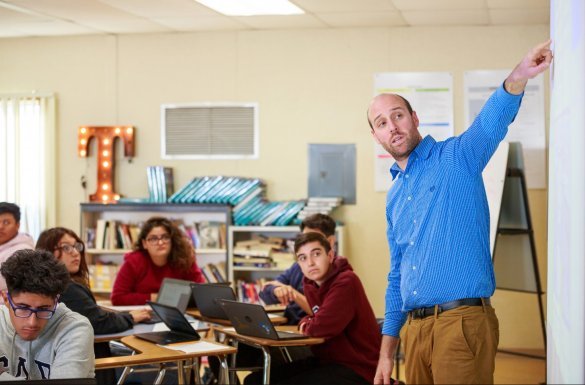DIG provides evidence-based educational resources that empower individuals and communities to make sense of our past, navigate our present, and shape our future.
The Digital Inquiry Group develops award-winning curricular materials, conducts rigorous research, and provides professional learning opportunities for educators.

The most crucial question today is not how to find information but whether that information should be believed.
- Young people are confused about the information they find online.
- If they are taught digital literacy in school, it is typically a stand-alone topic and too often based on dated approaches that no longer apply to today’s internet.
- Unreliable information finds its way into all subjects in the curriculum, making it a challenge to teach these subjects effectively.
- Our approach seamlessly weaves digital literacy into the core subjects of the curriculum.
- Our instructional model has been rigorously tested and shown to be effective in studies in the US, Canada, Sweden, Germany, and Italy.
Instead of a single textbook narrative, students learn to analyze competing accounts of the past.
- Too often history is reduced to the memorization of names and dates.
- Many history assessments don’t provide evidence of student thinking.
- Based on research with historians, our Reading Like a Historian curriculum asks students to use primary sources to answer historical questions.
- Our Beyond the Bubble assessments measure students’ historical thinking and can be completed in less than 10 minutes.
The DIG team has decades of experience as curriculum designers, classroom teachers, researchers, and teacher educators. We have been recognized with awards from UNESCO, the American Historical Association, the Organization of American Historians, the American Educational Research Association, the School Library Association, and other prestigious organizations.

Nonpartisan curriculum: We teach students how to think, not what to think.
Students need to learn to make arguments based on evidence. Learning to analyze sources of all kinds is crucial for understanding our past and present.
Research: Claims about curricular effectiveness must be backed by evidence.
Educators need quality resources and professional development to create classrooms that support historical thinking and digital discernment. These resources need to be backed by rigorous research.
Continuous improvement: Our work is strengthened by ongoing feedback.
We continually refine our approach based on feedback from educators. Our work depends on close collaboration with teachers and administrators.
Historical thinking: Using the skills of historians, students answer questions about the past.
Through inquiry-based instruction, students learn to source, contextualize, and corroborate primary sources to build historical arguments.
Digital literacy for all: We all benefit from learning to discern the quality and veracity of information.
From elementary students to adults, none of us received a manual for navigating the internet. Everyone can benefit by learning the strategies practiced by the savviest users of the internet.
Classroom-ready materials: Teachers need high-quality resources that have been tested in real classrooms.
All teachers deserve evidence-backed instructional materials that are ready to use and support them to reach their highest instructional goals.
Free resources: Quality educational materials must be accessible to all.
With your support, we are able to make high-quality, evidence-based, classroom-ready materials freely available to educators worldwide.